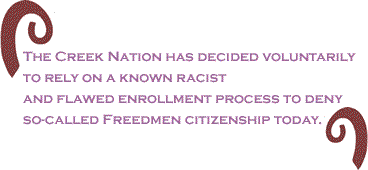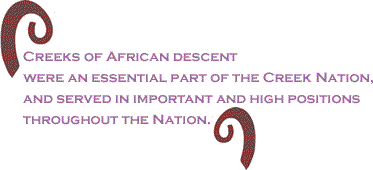
|
|||||||||||||||||||||
|
I am currently serving as co-counsel in litigation against the Muscogee (Creek) Nation that is of grave importance to the African-American community in general and to African-Americans whose ancestry is mixed with Native Americans in particular. The litigation involves the citizenship rights of Creeks of Afrikan descent who were enrolled on the 1906 Dawes rolls as “Freedmen.” This is a complex and fascinating case that requires a good understanding of American history, slavery, and Indian relations to fully appreciate. Historically, the Creek “Nation” comprised a confederacy of separate towns, tribes, and peoples. Each town was a complete governmental unit in and of itself. One such tribe was the Yamassee who, according to a nineteenth century United States census report, was “one of a small number of isolated tribes, of dark complexion” reported to have been “immigrants from Africa prior to the European discovery of America.” To put this early observation by the United States Department of the Interior into context: different peoples with different cultural and racial backgrounds were “full-blood” Creeks, just as today we have different peoples with different cultural and racial backgrounds who call themselves “full-blood” Americans. In 1832, the United States forcibly removed the Creeks from their traditional homelands (Alabama, Georgia, South Carolina, and Florida) and sent them to live in what is now Oklahoma. The Creeks lived in Oklahoma in relative peace until the Civil War. At the conclusion of the Civil War, the United States government negotiated and signed a new treaty with the Creeks. The Treaty of 1866 - signed by my paternal great-great-great-grandfather, Cow Tom - among other things outlawed slavery in the Creek Nation and granted citizenship to those formerly enslaved by the Creek Nation. From that point, all Creek citizens lived in relative harmony as one nation until the allotment era of 1898-1906. In fact, Creeks of African descent were an essential part of the Nation, and served in important and high positions throughout the Nation. Again consulting the 1894 U.S. Department of Interior census bulletin, we find that the Creek Nation was “alert and active…largely due to the negro element which fairly controls it.” Moreover, the report states “the Creek Nation affords the best example of negro progress. The principal chief, virtually a Negro, comes of a famous family in Creek annals. His name is Lequest Choteau Perryman.”
Unfortunately the relative harmony within which the diverse and intermarried members of the Creek Nation lived during the nineteenth century came to sudden halt with the passage of the Curtis Act in 1898. The Curtis Act allowed the United States government to destroy the Creek tribal government by taking away ownership of the land which had been held in common by the tribe and replacing it with individual ownership of 160 acres per Creek citizen. To accomplish the task of allotting the 160-acre parcels, Congress established the Dawes Commission to find, identify, and enroll all members of the Creek Nation eligible for an allotment. The Dawes Commission created two lists of members of the Creek Nation eligible for allotment: 1) the “Creek Roll” which was purportedly composed of Creek citizens with Creek blood; and 2) the “Freedmen Roll” which was purportedly a roll of those citizens of the Creek Nation who were formerly enslaved Africans and devoid of any Creek blood. However, using the hypo-descent rule - which was the public policy and practice at the turn of the century (if not today) that mandates “one-drop” of African blood makes a person African or Black - the Dawes Commission enrolled most Creeks of African descent (especially those with darker complexions) on the Freedmen Roll, regardless whether they or their ancestors were ever enslaved by the Creek Nation or how much “Creek” blood they actually possessed. In fact, noted Dawes Commission expert Kent Carter writes “in cases of mixed freedmen and Indian parents, which was common among the Creeks…the applicant was always enrolled as a ‘freedmen’.”
Without a doubt, the biased and racist actions of the Dawes Commission is the root of today’s problems faced by people of mixed African and Creek descent who wish to exercise their rights to be enrolled as members of the modern Muscogee (Creek) Nation. However, it is the Creek Nation that has decided voluntarily to rely on a known racist and flawed enrollment process to deny so-called Freedmen citizenship today. The Creek Nation has even had the audacity to claim that Freedmen do not possess any “Creek” blood, in stark contradiction to their own documents, U.S. History, and volumes of other scholarly and legal documents. We need your help to let the world know that the Creek Nation’s racist policy has disenfranchised and cut off thousands of Creeks of African descent from their birthright and heritage. We need your help to stop the Creek Nation’s racially discriminatory practice that bars Creeks of African descent from sharing in the benefits of being a citizen of a federally recognized tribe like the Creek Nation. Such benefits include, but are not limited to, housing stipends, college scholarships, free healthcare, and clothing for school children, and access to gaming revenues, all together totaling in the millions. We need your help to eradicate the racial discrimination that exists against people of African descent on the shores of this continent even in “Indian Country.” Some of the ways that you can help include: Consider writing a personal letter of support for the efforts of our clients, Mr. Fred Johnson and Mr. Ron Graham, on behalf of all Muscogee (Creek) Indians of mixed African heritage (on your letterhead if you have it) addressed to the Muscogee Creek Nation’s Principal Chief, A.D. Ellis. Chief Ellis’ contact information is as follows: P.O. Box 580, Okmulgee, Oklahoma 74447. Contact your federal elected officials expressing your outrage at this issue. Donate at least $10.00 to help cover legal and marketing fees. Ask your congregations, friends, and families to also donate at least $10.00. Donation should be made to African Indians (“African”) of the 5 Civilized Tribes Foundation, 115 89th Street, Oklahoma City Oklahoma 73139. African is a 501(c)(3) tax-exempt organization; therefore all donations are tax deductible. I pray that God aligns your heart to help in this most difficult, but noble endeavor. Lastly, I urge all that read this to Stand Up for Justice. Stand Up for Righteousness. Stand Up for Humanity. If not you, then who? If not now, then when? Damario Solomon Simmons practices law at SolomonSimmons & Associates, Tulsa, Oklahoma. He can be contacted directly at [email protected]. He urges that you visit his website at www.solomonsimmons.com or his client’s site at www.freedmen5tribes.com. |
Your comments are always welcome. Visit the Contact Us page to send e-Mail or Feedback or Click here to send e-Mail to [email protected] e-Mail re-print notice
If you send us an e-Mail message we may publish all or part of it, unless you tell us it is not for publication. You may also request that we withhold your name. Thank you very much for your readership. |
| September 15 2005 Issue 150 |
|||||||||
|
|||||||||
|
|
|||||||||
| Printer Friendly Version in PDF format. Download free Adobe Reader. | |||||||||
 |
|||||||||
 |
|||||||||
| |
|||||||||
| |
|||||||||



























